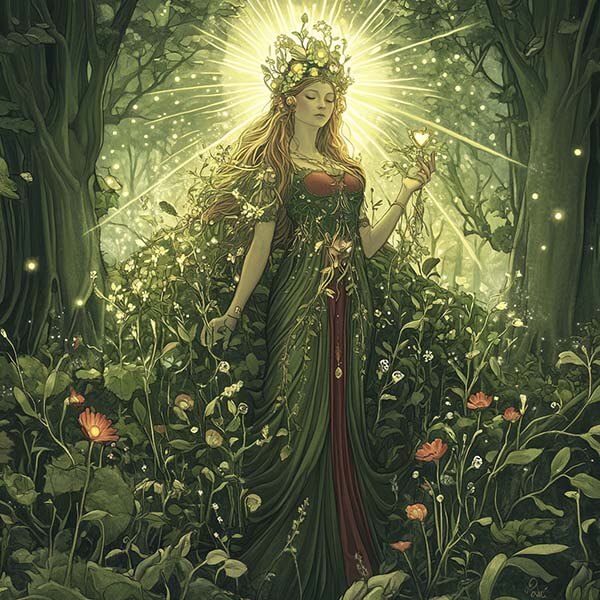
Akka
Goddess of the Earth
Karelian / Finnish Mythology
In Finnish, Akka means “old woman” and is the spouse and counterpart of Ukko. The goddess of the Earth grants fertility and symbolizes motherhood. Her lovemaking with her husband Ukko results in lightning bolts being cast across the sky, symbolizing the fertility of the Earth from the heavens.
Akka symbolizes fertility and is responsible for maintaining the livelihood of Earth’s crops, livestock, and nature. Through these deeds, she ensures the prosperity of humanity. In addition, Akka symbolizes feminine energy and creates a duality with Ukko’s masculine energy. Together, the two form the union of the sky and Earth, thus ensuring bounty and prosperity for life.
While Akka isn’t mentioned much throughout Kalevala, her role is inextricably tied to that of Ukko and maintaining a balance between Earth and the heavens.
- Domain: The Earth, fertility, motherhood
- Realm: The Earth
- Symbol: A circle or spiral
- Weapon/Relic: None
- Spouse: Ukko
- Worship: Sacrifice, prayer, rituals
- Offerings: Grain, bread, milk, honey, flowers
- Holidays: Juhannus (Midsummer Festival)
Crop Symbolism
As an agrarian culture, crops are integral to sustaining life for the ancient Finns. Grains were among the most essential crops for the ancient Finns. Before planting and sowing began, Finns often prayed to Akka for a bountiful harvest.
Barley is a sacred crop in the Kalevala and perhaps one of the most integral. As a staple, barley is tied to the people’s sense of abundance and symbolizes fertility.
Fruits represent the sweetness of life for the Finns. Berries and apples are particularly important, symbolizing the generosity of the Earth. Blueberries, cloudberries, bilberries, currants, and lingonberries are among the most essential fruits for the Finnish people.
Potatoes and other root vegetables are also a key symbol of Akka. These foods represent sustenance and nourishment for the Finns. Carrots, beets, turnips, and potatoes represent strength and stability to the Finns.
Animal Significance
Cows symbolize fertility and abundance in the Kalevala. These creatures are of great significance to humanity’s success.
Birds in Finnish mythology symbolize motherhood and are believed to carry messages to the gods. These creatures signify freedom, as they can freely roam the lands and skies.
Honey, the Nectar of the Gods
Honey also plays a vital role in symbolism and worship in the Kalevala and Finnish Mythology. It represents life’s sweetness, bestows magical properties, and represents a nurturing power. Honey is believed to foster väki, or life force, to pagan Finns.
Honey is often used in healing potions or salves and is known for its properties of protection and purification. Lemminkäinen’s mother collects a drop of honey in a thimble to revive him after his death to the Swan of Tuonela.
Celebrating Akka
Worshipping Akka generally coincides with rituals of agriculture and prosperity. Juhannus, or the Midsummer Festival, is Akka’s most notable worship holiday.
Offerings to Akka generally consist of grains, vegetables, fruits, pies, and sometimes baskets woven from plants. Some offerings also include leaving symbols or carvings of animals on an altar for her.
